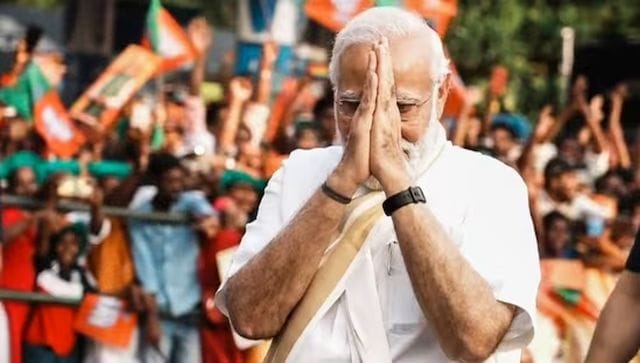India must be prepared for highly sophisticated, well-funded toolkits seeking regime change

An article on 2020 US presidential elections, Death by a thousand cuts: How Trump was robbed, details how Donald Trump was made to lose not by “in the face” criminality-like outright hacking of voting machines, but what can be better described as “death by thousand cuts”. None of these acts on its own amounted to prima facie wrongdoing, but in reality each is a scam that maintained a veneer of respectability.
The article talks about how they changed election laws just before the polls in such a way where previously illegal practices were made legal (mail in ballots and standards of verification), role of Big Tech that hid anything about Joe Biden and his family corruption, particularly his son Hunter Biden laptop explosive revelations, $400 million donation by Mark Zuckerberg that created organisations that state governments hired to run the election in swing states across the nation, among others.
The Zuckerberg-funded activist organisations which were supposed to be non-partisan focused their resources on multiple ways to benefit Biden and impede Trump in carefully selected counties with slim electoral vote margins. To top it all, Big Tech banned any criticism of the election. The article summarises the US 2020 election as, “in combination, an election where western deep state used extraordinarily and deceitful measures as a new form of institutional gerrymandering particularly in few swing states to change the outcome of the election”.
Related Articles
While the situation in Bharat is not exactly the same as in the United States, the end goal of subversion of the election process to institute regime change in 2024 has actually started happening in full swing by the breaking India forces using various methods. The detailed micro and macro planning by well-funded experts cannot be missed by anyone with a discerning eye. Word is that there are about 220 to 240 Lok Sabha seats identified across the country where there is tacit agreement among Opposition parties to field only one strong candidate with a sprinkling of weak candidates from the rest of the Opposition parties. These locations must have been carefully selected with thin margins to engineer an outcome. Just as the article on US elections said, there is nothing wrong on the surface but the voter as well as competition (BJP) is deceived that it is a multi-party candidate election whereas in truth it is not.
Just as in the US where supposedly non-partisan organisations created using a very large donation by Zuckerberg manipulated elections in carefully selected areas, India has its own set of NGOs, literally thousands funded by foreign entities. Adding to this, as documented in works like Snakes in the Ganga, there are many entities ostensibly created as companies providing services in the remote areas to circumvent Foreign Contribution Regulation Act laws. On the surface they are providing services but their reach is being used to propagate subtle messages to affect election outcomes. Their extensive reach to the last-mile voter can have deadly consequences for holding a free and fair election.
In recently-held elections in Karnataka, third party campaigning is believed to have been done by several NGOs in the remote areas more than a year before the election, saying that the ruling BJP is a “40 percent cut” party. The problem is these subtle campaigns are done in the name of NGOs established for public good or in the name of providing service. Worse, in the case of Karnataka it did not give a full picture of corruption in the state where the then Opposition party itself was led by someone accused of amassing thousands of crores of rupees in corruption.
Free and fair elections in India are challenged by another phenomenon called ‘freebies’. The recent Karnataka elections is again a case in point (along with other states like Punjab, Delhi) where freebies promised are believed to have played a large role in election outcome. This will be one of the strategies that could be used in 2024 as well with carefully planned messages propagated through media, NGOs, dubious service organisations and third-party campaigning.
This freebie culture raises many questions that the country needs to urgently address if democracy is to be preserved. First, these are not funded by politicians or political parties promising them, it is taxpayer funds. Do the parties have agreement from taxpayers to give away their funds? Then, there is even the issue of whether the promises made during elections to get votes can even be met, as is seen in Karnataka where big promises are made before elections and after winning elections, so many ifs and buts have been put in place to receive these freebies, which according to some outlets make almost everyone ineligible. None of the parameters for receiving the freebies was ever announced nor a true picture was given to voters before the elections. If voters were enticed and duped with such false promises, how can that be considered a free and fair election?
On the other hand, if the promises for freebies are kept after winning elections causing a large drain on the state budget, were the voters informed of the consequences of the drain, the lack of funds to do development projects and other state-provided services?
Then there is the question of making secret promises to sections of the voting community. Going back to Karnataka, after the election results were announced Muslim leaders stated that they were promised a Deputy CM and five ministerial positions that must have certainly helped to gain a large number of votes of that community which constitute about 10 percent of the total voter community in the state. When such wild promises are made, should this not be informed to the rest of the voting community before the elections so that an informed decision can be made by them? Yes, the bluff can be called when the next election comes after five years, but the voters get stuck for five years. One suspects this ploy will be used in 2024 as well, with deadly consequences.
Last but not the least, there may be attempts at creating multiple artificially created regional and national disturbances to divide and incite communities using well-devised toolkits.
One really hopes Bharat is prepared for these highly sophisticated and well-funded toolkits seeking to destabilise the country and usher in a regime change. The 2024 election will be a momentous one, in that case.
The writer is a US-based activist who has played a critical role in the introduction of paper trail for India’s Electronic Voting Machines called VVPAT. Views expressed are personal.
Read all the Latest News, Trending News, Cricket News, Bollywood News,
India News and Entertainment News here. Follow us on Facebook, Twitter and Instagram.
Facebook Faces Yet Another Outage: Platform Encounters Technical Issues Again

Uppdated: It seems that today’s issues with Facebook haven’t affected as many users as the last time. A smaller group of people appears to be impacted this time around, which is a relief compared to the larger incident before. Nevertheless, it’s still frustrating for those affected, and hopefully, the issues will be resolved soon by the Facebook team.
Facebook had another problem today (March 20, 2024). According to Downdetector, a website that shows when other websites are not working, many people had trouble using Facebook.
This isn’t the first time Facebook has had issues. Just a little while ago, there was another problem that stopped people from using the site. Today, when people tried to use Facebook, it didn’t work like it should. People couldn’t see their friends’ posts, and sometimes the website wouldn’t even load.
Downdetector, which watches out for problems on websites, showed that lots of people were having trouble with Facebook. People from all over the world said they couldn’t use the site, and they were not happy about it.
When websites like Facebook have problems, it affects a lot of people. It’s not just about not being able to see posts or chat with friends. It can also impact businesses that use Facebook to reach customers.
Since Facebook owns Messenger and Instagram, the problems with Facebook also meant that people had trouble using these apps. It made the situation even more frustrating for many users, who rely on these apps to stay connected with others.
During this recent problem, one thing is obvious: the internet is always changing, and even big websites like Facebook can have problems. While people wait for Facebook to fix the issue, it shows us how easily things online can go wrong. It’s a good reminder that we should have backup plans for staying connected online, just in case something like this happens again.
Christian family goes in hiding after being cleared of blasphemy

LAHORE, Pakistan — A court in Pakistan granted bail to a Christian falsely charged with blasphemy, but he and his family have separated and gone into hiding amid threats to their lives, sources said.
Haroon Shahzad, 45, was released from Sargodha District Jail on Nov. 15, said his attorney, Aneeqa Maria. Shahzad was charged with blasphemy on June 30 after posting Bible verses on Facebook that infuriated Muslims, causing dozens of Christian families in Chak 49 Shumaali, near Sargodha in Punjab Province, to flee their homes.
Lahore High Court Judge Ali Baqir Najfi granted bail on Nov. 6, but the decision and his release on Nov. 15 were not made public until now due to security fears for his life, Maria said.
Shahzad told Morning Star News by telephone from an undisclosed location that the false accusation has changed his family’s lives forever.
“My family has been on the run from the time I was implicated in this false charge and arrested by the police under mob pressure,” Shahzad told Morning Star News. “My eldest daughter had just started her second year in college, but it’s been more than four months now that she hasn’t been able to return to her institution. My other children are also unable to resume their education as my family is compelled to change their location after 15-20 days as a security precaution.”
Though he was not tortured during incarceration, he said, the pain of being away from his family and thinking about their well-being and safety gave him countless sleepless nights.
“All of this is due to the fact that the complainant, Imran Ladhar, has widely shared my photo on social media and declared me liable for death for alleged blasphemy,” he said in a choked voice. “As soon as Ladhar heard about my bail, he and his accomplices started gathering people in the village and incited them against me and my family. He’s trying his best to ensure that we are never able to go back to the village.”
Shahzad has met with his family only once since his release on bail, and they are unable to return to their village in the foreseeable future, he said.
“We are not together,” he told Morning Star News. “They are living at a relative’s house while I’m taking refuge elsewhere. I don’t know when this agonizing situation will come to an end.”
The Christian said the complainant, said to be a member of Islamist extremist party Tehreek-e-Labbaik Pakistan and also allegedly connected with banned terrorist group Lashkar-e-Jhangvi, filed the charge because of a grudge. Shahzad said he and his family had obtained valuable government land and allotted it for construction of a church building, and Ladhar and others had filed multiple cases against the allotment and lost all of them after a four-year legal battle.
“Another probable reason for Ladhar’s jealousy could be that we were financially better off than most Christian families of the village,” he said. “I was running a successful paint business in Sargodha city, but that too has shut down due to this case.”
Regarding the social media post, Shahzad said he had no intention of hurting Muslim sentiments by sharing the biblical verse on his Facebook page.
“I posted the verse a week before Eid Al Adha [Feast of the Sacrifice] but I had no idea that it would be used to target me and my family,” he said. “In fact, when I came to know that Ladhar was provoking the villagers against me, I deleted the post and decided to meet the village elders to explain my position.”
The village elders were already influenced by Ladhar and refused to listen to him, Shahzad said.
“I was left with no option but to flee the village when I heard that Ladhar was amassing a mob to attack me,” he said.
Shahzad pleaded with government authorities for justice, saying he should not be punished for sharing a verse from the Bible that in no way constituted blasphemy.
Similar to other cases
Shahzad’s attorney, Maria, told Morning Star News that events in Shahzad’s case were similar to other blasphemy cases filed against Christians.
“Defective investigation, mala fide on the part of the police and complainant, violent protests against the accused persons and threats to them and their families, forcing their displacement from their ancestral areas, have become hallmarks of all blasphemy allegations in Pakistan,” said Maria, head of The Voice Society, a Christian paralegal organization.
She said that the case filed against Shahzad was gross violation of Section 196 of the Criminal Procedure Code (CrPC), which states that police cannot register a case under the Section 295-A blasphemy statute against a private citizen without the approval of the provincial government or federal agencies.
Maria added that Shahzad and his family have continued to suffer even though there was no evidence of blasphemy.
“The social stigma attached with a blasphemy accusation will likely have a long-lasting impact on their lives, whereas his accuser, Imran Ladhar, would not have to face any consequence of his false accusation,” she said.
The judge who granted bail noted that Shahzad was charged with blasphemy under Section 295-A, which is a non-cognizable offense, and Section 298, which is bailable. The judge also noted that police had not submitted the forensic report of Shahzad’s cell phone and said evidence was required to prove that the social media was blasphemous, according to Maria.
Bail was set at 100,000 Pakistani rupees (US $350) and two personal sureties, and the judge ordered police to further investigate, she said.
Shahzad, a paint contractor, on June 29 posted on his Facebook page 1 Cor. 10:18-21 regarding food sacrificed to idols, as Muslims were beginning the four-day festival of Eid al-Adha, which involves slaughtering an animal and sharing the meat.
A Muslim villager took a screenshot of the post, sent it to local social media groups and accused Shahzad of likening Muslims to pagans and disrespecting the Abrahamic tradition of animal sacrifice.
Though Shahzad made no comment in the post, inflammatory or otherwise, the situation became tense after Friday prayers when announcements were made from mosque loudspeakers telling people to gather for a protest, family sources previously told Morning Star News.
Fearing violence as mobs grew in the village, most Christian families fled their homes, leaving everything behind.
In a bid to restore order, the police registered a case against Shahzad under Sections 295-A and 298. Section 295-A relates to “deliberate and malicious acts intended to outrage religious feelings of any class by insulting its religion or religious beliefs” and is punishable with imprisonment of up to 10 years and fine, or both. Section 298 prescribes up to one year in prison and a fine, or both, for hurting religious sentiments.
Pakistan ranked seventh on Open Doors’ 2023 World Watch List of the most difficult places to be a Christian, up from eighth the previous year.
Morning Star News is the only independent news service focusing exclusively on the persecution of Christians. The nonprofit’s mission is to provide complete, reliable, even-handed news in order to empower those in the free world to help persecuted Christians, and to encourage persecuted Christians by informing them that they are not alone in their suffering.
Free Religious Freedom Updates
Join thousands of others to get the FREEDOM POST newsletter for free, sent twice a week from The Christian Post.
Individual + Team Stats: Hornets vs. Timberwolves
CHARLOTTE HORNETS MINNESOTA TIMBERWOLVES You can follow us for future coverage by liking us on Facebook & following us on X: Facebook – All Hornets X – …
Source link
-

 MARKETING7 days ago
MARKETING7 days agoThe key to correcting the C-suite trust deficit
-

 MARKETING6 days ago
MARKETING6 days agoA Recap of Everything Marketers & Advertisers Need to Know
-

 PPC4 days ago
PPC4 days agoHow the TikTok Algorithm Works in 2024 (+9 Ways to Go Viral)
-

 MARKETING4 days ago
MARKETING4 days agoHow To Protect Your People and Brand
-

 SEARCHENGINES5 days ago
SEARCHENGINES5 days agoGoogle Started Enforcing The Site Reputation Abuse Policy
-

 SEO5 days ago
SEO5 days agoBlog Post Checklist: Check All Prior to Hitting “Publish”
-

 SEO3 days ago
SEO3 days agoHow to Use Keywords for SEO: The Complete Beginner’s Guide
-

 PPC5 days ago
PPC5 days agoHow to Craft Compelling Google Ads for eCommerce
















